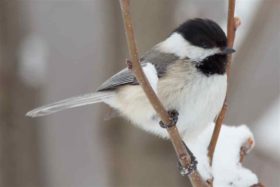 TRAIL REPORT: Conditions are poor due to rain and warm weather. Opening of Ski for Free this Thursday is doubtful.
TRAIL REPORT: Conditions are poor due to rain and warm weather. Opening of Ski for Free this Thursday is doubtful.
In the predawn hours of December 21st, we in the Northern Hemisphere experienced the Winter Solstice. In astronomical terms, this means the Earth’s axis is tilting away from the Sun, but to most of us, it means the days are short and the nights are very long….like fifteen hours long.
It’s irritating to have to keep resetting the parking lot lights at Crossroads, but we do have lights and also heat in the learning center so here at Big Creek, winter is survivable. It’s just the season when we offer skiing and snowshoeing.
For day-feeding little birds—black-capped chickadees come to mind— short days and long nights can be a genuine threat. Unlike most of our winter wildlife, chickadees do not build up a layer of insulating fat. They literally are staying alive one day at a time.
But they do stay alive during Wisconsin winters, so they must have adaptations to help them. Chickadees grow new feathers each fall, so in winter, they have 25% (by weight) more feathers than in summer. And the tiny birds can fluff up their feathers to increase the insulating capacity enough so if they shiver (and chickadees do shiver most of the winter) they can maintain their 108 degree daytime body heat.
But at night, if temperatures plunge, chickadees enter a state called “regulated hypothermia” which means their body temperatures drop by 12-15 degrees. This drop in body temperature enables them to conserve heat, in much the way we humans lower the thermostat at night to conserve fuel.
For birds, food is fuel. Chickadees spend every daylight hour stuffing themselves with food—the higher fat content, the better. They like insects and fatty seeds, and suet (or in nature, carrion) Though each morning, their little bodies contain no fat, by afternoon, they are pudgy. Several studies have revealed that a chickadee consumes 60% of its body weight each day. And with only nine hours of daylight, that requires frantic feeding. The birds use up the food by shivering all night, so they must start over each morning. No wonder they are the first birds at the feeder every day.
What if they can’t find enough food? Actually, they usually can because a good number of the seeds they gather each fall and winter, they hide in cracks and crevises of trees. Because they have remarkable spatial memories, they are able to find the cached seeds when they need need them.
We have a tradition at Crossroads, or I should say, until this year, we had a tradition at Crossroads. Each year, I would collect my Christmas cards, sort out the ones with pictures of birds on them, figure out the most popular and then, on Christmas Eve afternoon, present a lecture called “Greeting Card Birds.” Most years, the most popular birds were either cardinals or chickadees.
Well, this year, most of the greeting cards which have shown up in our mailbox hace darling images of grandchildren…or families.. or exotic vacations. Nobody is sending bird cards, at least to me.
So on Christmas Eve, at 10:00 (the afternoon would never work—Packer game), we will present a holiday lecture, called “Cardinals and Chickadees”. And if there is interest, we might also discuss some of the other birds depicted on cards of Christmases past. The program will be last an hour and is free and open to the public.
Will we have free skiing over the holidays? It will depend on the weather and the availability of volunteers. Check our website www.CrossroadsatBigCreek.org for trail conditions and hours of our Ski Loan program.
Crossroads at Big Creek is a learning center made up of the Big Creek, The Cove, and the Ida Bay preserves. The Collins Learning Center, located at 2041 Michigan just east of the roundabout in Sturgeon Bay, is open 2:00-4:00 daily, but will be closed December 25. Our trails will be open.
Saturday, December 24, 10:00 Lecture: Cardinals and Chickadees
This lecture will feature the birds which most often appear on holiday greeting cards. Learn a little about the life history of the birds which make us merry during this season. Lecture hall of the Collins Learning Center. Free and open to the public.

